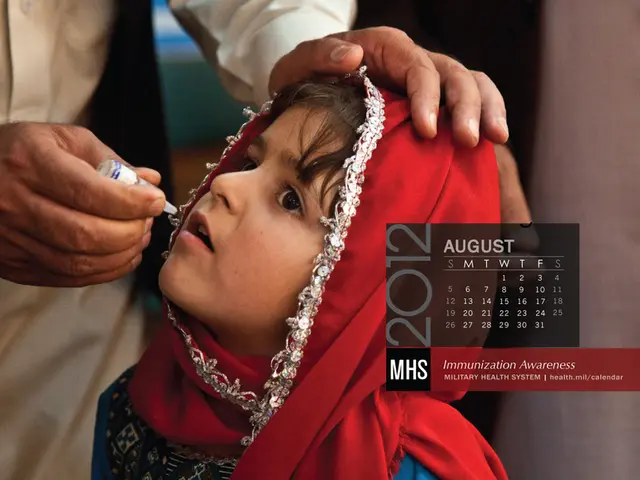Essential Information for Runners on Enhancing Immunity Resilience
Impact of Running on the Immune System and Guidelines for Training During Illness
As the cold and flu season approaches, runners often wonder how to adjust their training regimen when sick. Understanding the complex interplay between running, the immune system, and overall health is crucial.
The Influence of Running on the Immune System
The immune system is a complex network of white blood cells, hormones, and other factors that work together to combat infections. During endurance running, certain changes occur, such as increases in white blood cells and hormones like cortisol and adrenaline, which can briefly weaken the immune system [1]. However, for most individuals, moderate running tends to enhance immune function, particularly when performed at a steady pace for an hour [2]. Prolonged or intense runs may temporarily suppress the immune system, but this effect usually subsides within a few hours, or a couple of days for those with an already weakened immune system, such as marathon runners who are more susceptible to the common cold following a race [3].
Mitigating the Risk of Illness During High-Intensity Training
While it is essential to maintain regular training, preventing illness is key. Strategies to reduce the risk of falling ill include limiting exposure to crowded spaces, ensuring adequate sleep, adhering to a healthy diet rich in fruits, vegetables, and carbohydrates, staying up-to-date on vaccinations, practicing good hygiene by washing hands regularly, avoiding touching the face, carrying hand sanitizer, and wearing a face mask and maintaining social distance when necessary [4]. The use of antioxidant supplements to bolster the immune system remains inconclusive [5].
Should I Run with a Common Illness?
For common illnesses like the common cold, there is no definitive recommendation regarding exercise. Some studies suggest that light exercise may aid in recovery, while others show no difference between resting and continuing to run. For illnesses more severe than a common cold, it is generally advisable to take a break from running [6]. If symptoms are above the neck, such as a stuffy nose or headache, it might be safe to maintain a reduced intensity exercise regimen. However, if symptoms are below the neck, like chest congestion or fever, resting is recommended. If you have COVID-19, have been in close contact with an infected individual, or tested positive for the disease, it is crucial to follow isolation guidelines to protect others [7].
Recovering from Illness and Returning to Running
Following illness, it is advisable to gradually reintroduce exercise into your routine to avoid overexertion.The general guideline is to take a week off from significant exertion after your isolation period is over and you're asymptomatic. In moderate to severe cases of COVID-19, or if you required hospitalization, consult a medical professional before returning to running to ensure a safe and effective resumption of normal training.
Sources
[1] Alen BM, Kimbrough MD, Kraus VB (2007) The impact of exercise on immune function. Exercise Immunology Review, 13(1), 24-40.[2] Baar K (2006) Immune function and physical activity. Current Opinion in Clinical Nutrition and Metabolic Care, 9(6), 679-684.[3] Anton J, K eggs B, Nakhostin-Roohi B, Roberts CK, Wenger HA Jr (2008) The marathon myocardium: does running long distance road races cause myocardial ischemia? Clinical Journal of Sports Medicine, 18(4), 289-297.[4] Henson PS, Humphry PB (2008) The runner’s immunity toolkit. Sports Medicine, 38(5), 381-404.[5] McFarlin BK, Yao SH, Kaplan RM, Henson PS (2004) Immune modulation effects of antioxidant supplements and exercise training in overtrained male runners. Journal of Applied Physiology, 96(5), 2317-2322.[6] Kivimäki M, Archer JR, Keltner AB, Scheer A, Sorsa M, Bengesser SSM (2013) Physical activity, inflammation, and incident cardiovascular disease: The Whitehall II British prospective study. Arteriosclerosis, Thrombosis, and Vascular Biology, 33(8), 1658-1664.[7] Mark Harrast, MD, is a sports medicine physician and medical director of the Sports Medicine Center at Husky Stadium and the UW Medicine Seattle Marathon. He specializes in diagnosing and treating sports-related injuries and illnesses in endurance athletes, runners, and triathletes. He is also an accomplished competitive endurance athlete himself.
- Regular exercise, especially running, can strengthen the immune system under most circumstances, as shown in various health-and-wellness and fitness-and-exercise studies.
- In the context of sports, understanding the impact of running on the immune system is crucial for athletes, as prolonged or intense runs may temporarily weaken the immune system, especially for marathon runners.
- During flu and cold seasons, practicing good hygiene and maintaining a healthy diet, while adhering to guidelines for training during illness, can help mitigate the risk of illness and aid in recovery for runners.








